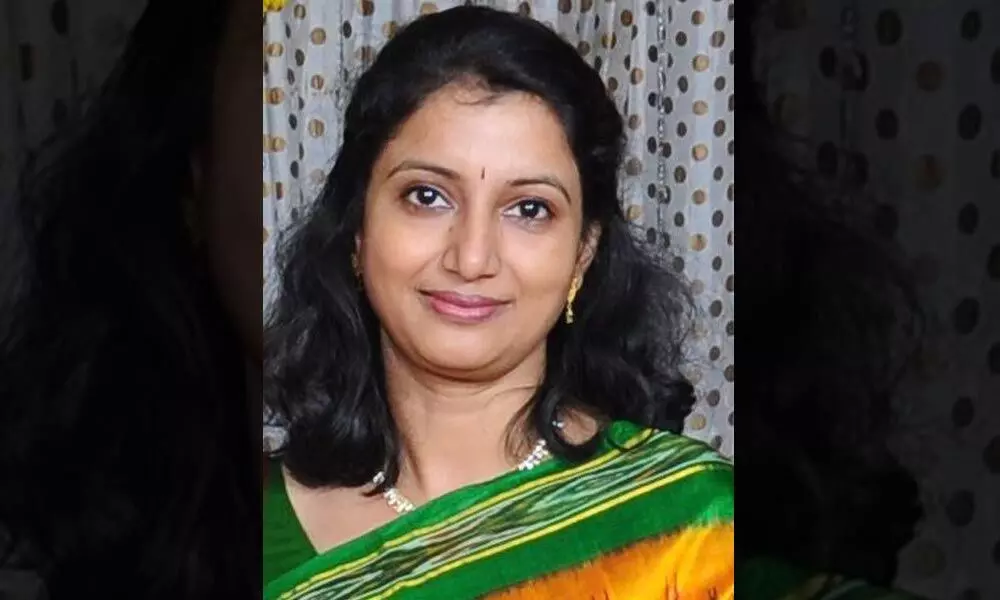Live
- Spoorti Srinivas presented Pride of Nation award
- Book expo venue shifts to Indira Gandhi stadium
- CM to keep BCs poll promise
- India Faces Blow as Pacer Mohammed Shami Ruled Out for Remainder of Australia Series
- Farmer’s Day Celebrations Held at Palem Agricultural Research Center, Nagarkurnool
- Biden Pardon: Joe Biden Commutes Death Sentences of 37 Inmates, Including Child Killers and Mass Murderers
- South Korea: Yoon believes impeachment trial takes priority over martial law probe
- Strict Action for Non-Adherence to Time Management - DMHO Dr. Swarajya Lakshmi
- Joyful Semi-Christmas Celebrations at Sri Saraswathi International School
- Over 13.29 lakh houses approved for rural poor in Maharashtra: Shivraj Chouhan
Just In
Meet Dr. Sreedevi one of the 75 women in STEAM Recognised by the Office of the Principal Scientific Adviser, GoI


Dr. Sreedevi Upadhyayula, Department of Chemical Engineering, Indian Institute of Technology
The world of science has indeed come a long way in terms of inclusion of women scientists, researchers and educators in the past few decades.
New Delhi: The world of science has indeed come a long way in terms of inclusion of women scientists, researchers and educators in the past few decades. In India too, women have been leading groundbreaking scientific research, they are also putting in much needed efforts towards sustainability and environmental conscience.
Dr. Sreedevi Upadhyayula, Department of Chemical Engineering, Indian Institute of Technology Delhi spoke with The Hans India on her work in converting CO2 (Carbon Dioxide) into renewable fuel, her journey as a women researcher and what lies ahead for women who wish to pursue science in the coming decades. According to the latest announcement by IIT Delhi, Professor Sreedevi is recognized as 75 women in STEAM (fields of Science, Technology, Engineering, Arts and Mathematics) by the Office of the Principal Scientific Adviser to the Government of India.
"We are working on integrated absorption and conversion of Co2 into renewable fuels. Co2 if it can be reduced it can be converted into renewable fuel such as ethanol… I am the Principal Investigator in this project," Dr. Sreedevi spoke on her latest work.
Upon asking about the current status of participation of women in the world of science and scientific research, Dr. Sreedevi believes that the contribution has come a long way and that inequality gap in the field has drastically shrunken over the years, however, the number of female researchers is quite low in India. She stated that the opportunity and treatments towards women has been at par in the field of science.
Dr. Sreedevi completed her PhD in 2001 jointly from National Chemical Laboratory (NCL), Pune and Indian Institute of Technology Kharagpur. She later did her post-doctoral research at University of Notre Dame, Indiana, USA, and then later joined the Department of Chemical Engineering at IIT Kharagpur as an Assistant Professor in January 2004. Prior to her PhD pursual, Dr. Sreedevi had also worked for BHPV Ltd., Visakhapatnam, subsidiary of BYNL group and APL, Chennai, subsidiary of PTE, Singapore.
On her experience as an educator at IIT, Delhi, Dr. Sreedevi said, "I teach Petroleum Refinery Engineering. So, there are quite a number of my students, at Masters level and B.Tech level, who are now employed in good organisations such as Indian Oil Corporation (COIL) or other industries like Reliance. Of late there have been a number of students who are floating their own start-up ventures. This I have seen quite a lot in recent times."
Dr. Sreedevi says that more women of science are getting into the fields of data analytics but their option of taking a lead in research, as educator or as an entrepreneur depends on their interest, not just because of the ongoing boom of the start-up ecosystem. Her own interest towards science grew with the influence and encouragement she received from her family. While her father is a mechanical engineer with an MBA, and worked for companies like BHEL and Bharat Heavy Plate and Vessels Ltd (BHPV) in Visakhapatnam. She received her early education in Visakhapatnam and did her B.Tech from College of Engineering, Andhra University.
"My mom was a mathematics and chemistry teacher. So, the campus that we grew up in (BHPV, Visakhapatnam) was very competitive and all were encouraged, girls and boys both. We had real tough competition with the boys, the number of girls in school was always less and ofcourse and at that time girls' option for engineering was less. Girls opting for higher education through MSc. and medicine were more," Dr. Sreedevi said.
"I always had a very supportive system. My mother always encouraged me and my father said that I'm supposed to stand on my feet. I will not marry you until you stand on your feet. My aunt, from my father's side, was a civil engineer and my father spoke highly of her. She retired from National Fertilizers Limited, Panipat. So, she was one of my inspirations to pursue science," she added.
Dr. Sreedevi joked that the other reason why she opted for engineering was that she disliked the sight of blood and hence did not wish to enter the field of medicine. She added that the interest of girls towards science has evolved amongst the current generation. She does, however, believe that there are too many distractions in today's time that might keep one away from pursuing science actively.
On scientific research and development towards clean energy, Dr. Sreedevi said, "Knowing that crude oil are going to deplete fast, alternate sources of energy need to be seen. So, that's why we are pushing into the energy sector. Also, the pollution as you can see in Delhi, needs to be dealt with. Research always focuses on trying to mitigate the problems."

© 2024 Hyderabad Media House Limited/The Hans India. All rights reserved. Powered by hocalwire.com






